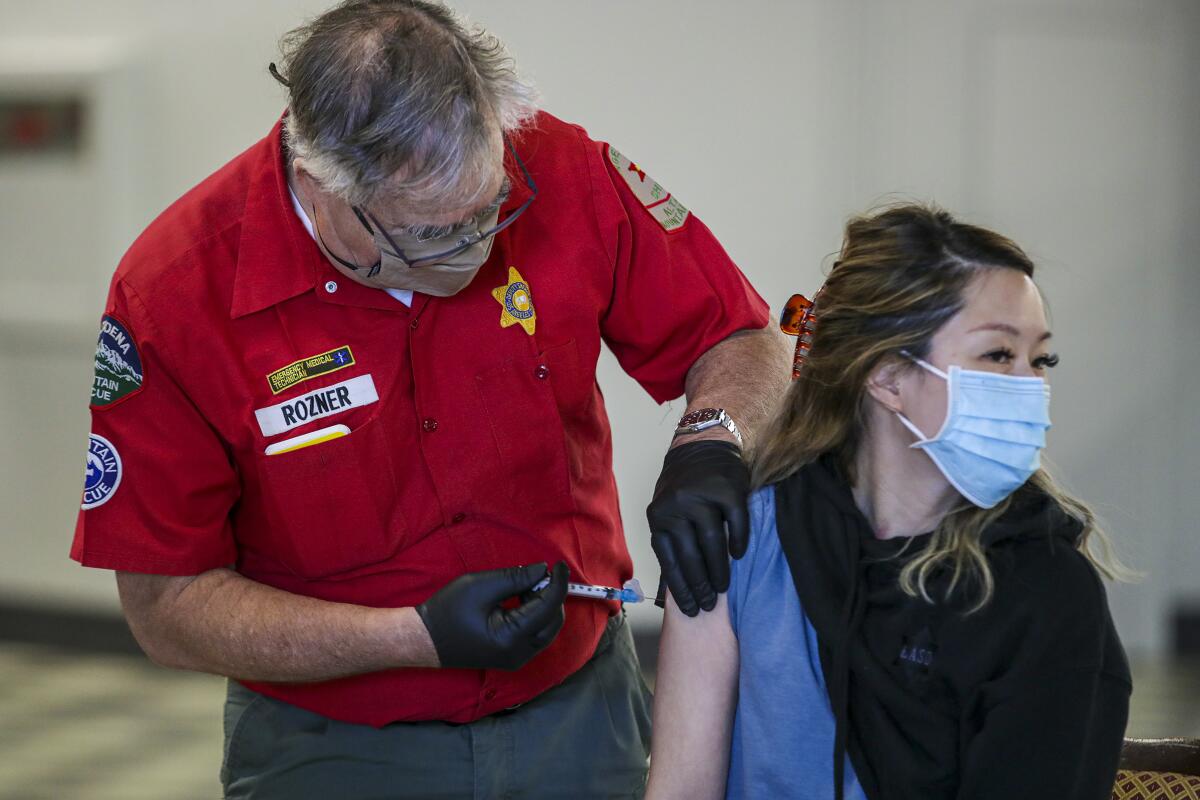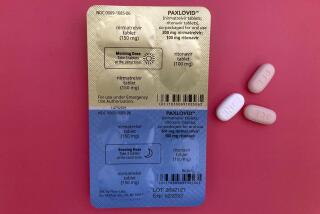Editorial: Could COVID-19 vaccines be mandated? Federal law needs clarification

- Share via
Right now, people eager for protection against COVID-19 are desperately logging onto websites over and over to try to find a place with vaccines on hand. But as the supply of vaccines increases enough in the coming months to provide all adults the necessary doses, the question will shift from “How many people will be protected soon?” to “Does everybody have to get vaccinated?”
That’s a question that Anthony Fauci, director of the U.S. National Institute of Allergy and Infectious Diseases, and other federal health officials are wisely dodging for the moment. It’s better to persuade people to come in for their shots than to try to force them in. Despite the more than half a million fatalities and innumerable serious, long-lasting side effects inflicted by COVID-19 in this country, people often are leery of new vaccines and want to see how they play out in general use. There also are people who are stubbornly and unreasonably anti-vaccine.
At some point, though, public health could depend on more people being inoculated. And if it does, government officials and private employers will confront a problem: It’s not at all clear that anyone can be compelled to take the current vaccines.
So far, the studies on the COVID-19 vaccines in use have been positive. They truly are effective at protecting the recipients from disease, and those who do get infected generally have much milder cases. They also appear to reduce the chances that vaccinated people will pass the virus along to someone else. The vaccines themselves have been safe with manageable, short-term side effects.
It’s not surprising, then, that the number of Americans who say they intend to be vaccinated has grown over the last couple of months. At this point, 69% of those surveyed say they have been or will be inoculated, up from 60% in November, according to the Pew Research Center. But if the number doesn’t continue to improve, the population won’t reach herd immunity. Worse, the level of contagion will remain high enough for new mutations to become established.
Businesses, schools, universities and other employers have more immediate reasons to push for employees and the adults they serve to be vaccinated: so that people can return to normal activity safely. Museums, malls, amusement parks, movie houses and stadiums might want to ensure that visitors are immunized to prevent business-deflating superspreader events.
But before society determines who, if anyone, must be vaccinated, we have to know whether such a mandate would even be legal.
Ordinarily, this wouldn’t be much of an issue. The courts have clearly established that states have a right to require students to receive the usual childhood vaccinations in order to attend school; California has one of the strongest laws in the country on that. And private employers in most states can require many things of employees, including submitting to vaccines that prevent other workers as well as customers from getting sick.
But the COVID-19 vaccines are in a different category, approved by the U.S. Food and Drug Administration under what’s called “emergency use authorization.” That designation made the lifesaving vaccines available after they were successful in clinical trials but before they had gone through all the hoops a vaccine normally would. The process is ongoing, but it will take a year or two to complete, and few of us want to wait that long. The health of the nation cannot afford it.
The 2003 law allowing emergency use appears to specify that people cannot be required to use any of these drugs or devices. Or maybe it doesn’t. The wording is so confusing that even legal experts aren’t sure.
Each person must be informed “of the option to accept or refuse administration of the product,” the law states, but it goes on to say that they must be told about “the consequences, if any, of refusing.”
The first part indicates that everyone has the right to refuse an emergency-use vaccine like the three in U.S. circulation now. But then what’s that part about consequences? Does it refer only to health consequences, as in catching a potentially fatal illness, or does it mean the government could impose a fine, or an employer could fire you, or a school could refuse your child entry?
The affected businesses and public agencies need answers, which could come from Congress amending the language or a court ruling clarifying the situation. Or we could just wait a year or two until the vaccines go through the full approval process, risking the emergence of more mutant strains and possibly many unnecessary deaths. Lawmakers, it’s your call.
More to Read
A cure for the common opinion
Get thought-provoking perspectives with our weekly newsletter.
You may occasionally receive promotional content from the Los Angeles Times.










